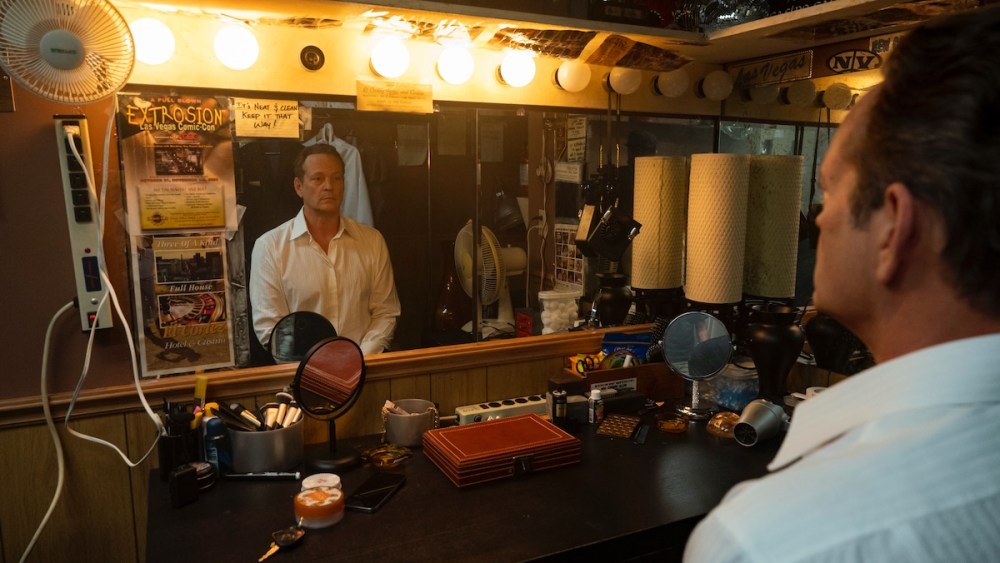Who knew Vince Vaughn could carry a tune? Turns out, the actor’s been singing right under our noses for years, from the ironic Alanis Morissette cover he delivered in “The Internship” to his cringy rendition of “All the Gold in California” in the movie “Arkansas,” but it wasn’t until “Easy’s Waltz” that it became clear Vaughn could’ve been a crooner in another life.
“Easy’s Waltz” is like a window into that life, and maybe a sigh of relief that the “Swingers” star took a different path — since he’s certainly had it easier than his character does trying to sustain his career as a cabaret act. Vaughn plays Lew Evans, whose friends call him “Easy.” He’s like a laidback Dean Martin who never got discovered, despite regular appearances at one of Las Vegas’ decaying older venues, where he sexily saunters his way through unconventional ’80s standards like “Against All Odds” and “I Wanna Dance With Somebody,” before blowing the roof off with his take on Ultravox’s “Vienna.”
There’s a version of this guy who could easily support another one of Vaughn’s brash bro comedies. Instead, as “True Detective” creator Nic Pizzolatto sees Easy in his beautifully written feature directing debut, he serves as more of a tragic figure: Grounded, loyal and honorable to a fault, the man’s got talent, as well as a tendency to self-sabotage. How else to describe the way he’s been dragging along his no-good younger sibling Sam (Simon Rex), who pawns Easy’s prized ring behind his back and siphons off his brother’s success?
A low-key cousin to ’80s movies like “Tender Mercies” and “The Fabulous Baker Boys,” in which pathetic middle-aged musicians circle the drain of their own existence, “Easy’s Waltz” is a character-driven indie drama of the kind that launched Vaughn’s acting career. Watching Vaughn embody Easy during a precarious late-career moment of opportunity, I was also reminded of “Bob le Flambeur,” in which the incorrigible French gambler stumbles home from the backroom poker games at dawn and drops a coin into the slot machine behind the door of his own apartment. In Easy’s case, he never risks enough to win big — but that also protects him from losing everything.
Movies like this don’t exactly light up the box office, but they stick with the folks fortunate enough to see them. Years earlier, Easy made that kind of impression on Al Pacino’s Mickey Albano, a louche local personality who books talent for the Wynn casino. Mickey has power, but more importantly, he has taste, and when he happens to catch one of Easy’s performances at a moment when the singer is pouring just a little too much of his soul into the show, he calls Easy over and offers his a chance the singer never thought would come: How would he like to play the Wynn?
By this point, we’ve already seen what bad news his brother Sam can be, via one of those smart Pizzolatto-classic scenes — this one set at a seedy pawn shop off the Strip — that reveal volumes about his characters’ personality and past relationships. Now Sam steps in as Easy’s manager, jeopardizing the deal even before it’s signed (in a weird coincidence, Sam had hit it off a few nights earlier with Lucy, the same young woman Mickey brought to his brother’s show, played by Kate Mara). Easy has secrets of his own, as when he runs the contract by an old acquaintance (Cobie Smulders), a lawyer who might have been his life partner had things turned out differently — though most of those details are nestled between the lines.
The arrangement between Mickey and Easy suits them both, and we sense that the older man is living out some kind of vicarious thrill opening doors for his grateful new act. Easy belongs to an earlier time (just don’t call him a Boomer) and honestly doesn’t realize what a viral moment he’s having when someone records his version of Mike and the Mechanics’ “Silent Running” and posts it online. Suddenly, Mickey is offering him a chance to play the main stage, which sets Sam’s greedier instincts into overdrive. Not only is he playing with fire by seeing Lucy behind Mickey’s back, but he hatches a scheme to steal and resell the QR codes off casino vouchers.
The pieces of Pizzolatto’s script don’t quite fit together, but the overall shape is clear. He has mapped a Faustian dilemma on top of a modern-day Greek tragedy, in which Easy must choose between the two things he wants most: a singing career and saving his brother, the latter being a responsibility no one ever asked him to shoulder. Pizzolatto turns out to be strong with actors, getting great performances from everybody, even Rex, a loose cannon whose role in “Red Rocket” created opportunities far beyond his abilities. Pacino hasn’t been this good since “Once Upon a Time in Hollywood.”
As the film winds down, Pizzolatto reveals some tough existential insights personal enough to cut past the hard-boiled shorthand such movies so often serve up. It feels like an indulgence to give Easy a climactic concert in which nearly every significant person in his life is present — all but his mother, who makes an earlier appearance in a devastating single-scene cameo by Mary Steenburgen. Still, there’s something touching in the man’s belief that music can bring people together.

